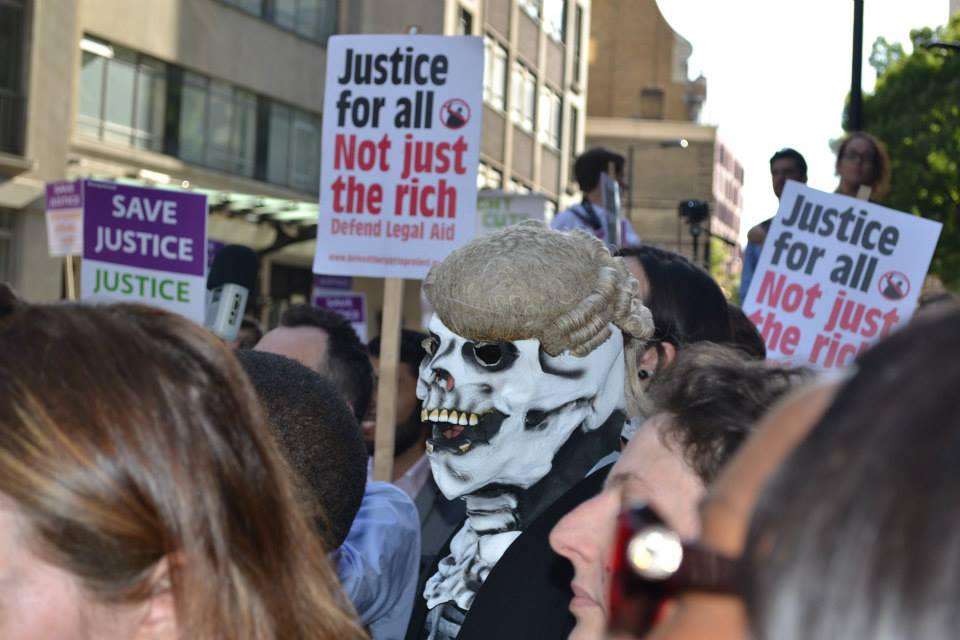‘This organisation thinks that legal aid is an avocado,’ Michael Fordham QC told hundreds of lawyers and campaigners outside the Ministry of Justice on Tuesday night. ‘They think it’s soft,’ he said. ‘They think you can cut it whenever you want – and keep cutting it – and they think it doesn’t matter because nobody really needs an avocado.’ The prominent human rights barrister was speaking at a ‘Save UK Justice’ demo organised in less than a week by trainees from the Tottenham-based legal aid firm Wilsons Solicitors LLP to protest against the government’s latest attack on legal aid, reports Mary-Rachel McCabe.
- Pictures by Kim Evans, Jon Robins and Symeon Brown (HERE)
The demo marked the close of the justice secretary Chris Grayling’s hugely controversial Transforming Legal Aid consultation – see HERE – which put forward plans for the introduction of price competitive tendering (PCT) into criminal defence work in order to reduce the legal aid bill by a further £220million. The way in which the government proposes to run the tendering system would result in clients having no choice of which solicitor should represent them (see HERE and HERE).
Fordham rejected the justice secretary’s proposals, as he held aloft his ‘avocado of justice’:
‘We’re here to tell them that legal aid is not an avocado. Legal aid is the beating heart of the rule of law… The treasury may say, “take out the knife and cut into it” but this ministry needs to say “piss off and put the knife away.” Otherwise, this organisation doesn’t deserve to be called the Ministry of Justice.’
Other speakers at the demo included QCs Geoffrey Robertson, Dinah Rose and Stephen Knafler, the human rights campaigner Bianca Jagger, as well as campaigning groups such as Liberty, Reprieve, Freedom from Torture and the Howard League for Penal Reform. Hundreds of charities, campaigners and lawyers blocked the road outside the Ministry of Justice chanting ‘Chris Grayling, shame on you’ and ‘stop the raid on legal aid’ as the speakers took to the podium to condemn the ‘unjust’, ‘unworkable’ and ‘shameful’ proposals.
Barrister and Haldane Society member Anna Morris argued that the government is ‘ideologically committed’ to the destruction of the welfare state, of which legal aid is the fourth pillar. Labour MP David Lammy agreed. ‘We are living in times when it feels as if we have a government that is intent solely on turning neighbour against neighbour,’ he said. But the welfare state – so carefully crafted by the Attlee government in 1948 – ‘is worth fighting for’, he declared.
Kat Craig, legal director of Reprieve, also lambasted the government’s proposals, arguing that the legal profession needs to unite together in order to defeat them, and go on strike if necessary:
‘This is the last stand. If not now, when? … We need to stand united in the fight to save UK justice. Because if we don’t do it now, I fear in 10 years’ time we’ll look back on today as the day that UK justice died and these bastards destroyed it. ’
Not about lawyers
A number of the speakers at the demo rebutted the media’s characterisation of ‘fat-cat legal aid lawyers’, motivated only by self-interest in their dissent to the proposed cuts. ‘None of this is primarily about lawyers,’ read a statement from Michael Mansfield QC, ‘It is about a basic provision, justice – the very substance of what is left of our democracy.’
Dinah Rose QC, a barrister at Blackstone Chambers, opened her speech by declaring her ‘lack of interest’ in the Save UK Justice campaign, because as someone who has never done criminal legal aid work the cuts would have ‘no impact whatsoever’ on her income.
‘I am here because these proposals appall me because of what they will do for access to justice for those who are most vulnerable and about the quality of justice which our system provides.’
Dinah Rose
The public law barrister was similarly appalled by the ‘sheer incongruity’ of PCT as a policy of a Tory government:
‘What on earth is a Conservative-led government doing introducing a series of monopolies that are immunised from competition? It’s contrary to the discipline of the free market.’
James Welch, legal director of Liberty, also expressed concern about the impact PCT will have on the quality of justice in this country. ‘Squeezing out decent criminal practitioners will drive down standards and inevitably lead to miscarriages of justice,’ he said. Welch also criticised the inequality of the so-called ‘libel tourism’ phenomenon, whereby Russian oligarchs are welcomed into UK courts to settle their multi-million pound libel disputes:
‘We cannot provide a first rate justice system to the rich from abroad in this country and deny it to the poor within our own borders. Justice must be equal and open to all.’
James Welch
As well as introducing price-competitive tendering into criminal legal aid, the ‘Transforming Legal Aid’ consultation paper also seeks to introduce a residence test to civil legal aid, restricting eligibility to those with at least 12 months’ continuous ‘lawful residence’ in the UK.
Dr Adeline Trude from Bail for Immigration Detainees lambasted the residence test as ‘unworkable, discriminatory, and in breach of human rights’, while Deighton Pierce Glynn’s Sue Willman likened it to the days when private landlords could put a sign on their properties saying: ‘no blacks, no dogs, no Irish’. ‘Will legal aid solicitors be forced to put a sign on their doors saying “no migrants”?’, she asked the demo.
Hidden Agenda
In April of this year, Chris Grayling appeared on Radio 4’s Today programme [HERE] to justify his proposal in the consultation paper to restrict access to judicial review. ‘In 2011 there were 11,359 applications for judicial review [and] in the end 144 were successful,’ he said. Martha Spurrier, a lawyer at the Public Law Project, rebutted Grayling’s statistics entirely when she spoke on Tuesday night, declaring simply, ‘that is a lie’. Spurrier went on to clarify the statistics on judicial reviews in this country – which in fact demonstrate a significant success rate – and said,
‘What this shows is that time and again public bodies are committing wrongs against citizens and being found out… If these proposals go through, the individual will no longer be able to challenge the state for these wrongs we know they commit… Tell everyone you know they are being grossly misled by this government. Reforms based on lies cannot be tolerated.’
Geoffrey Robertson QC was similarly vociferous in his denigration of the proposals to curtail judicial review, arguing that it is not really about cost-cutting, but rather ‘there is a hidden agenda here and it is an agenda to enable the government to behave illegally without being called to account. The government is protecting itself from the revelation of the truth.’
There are many other ways of cutting spending, argued Robertson, as he pointed out that the £90billion Defence Secretary Phillip Hammond is currently spending on a replacement for Trident could pay for 45 years of legal aid, and criticised Theresa May for instructing three £900-per-hour QCs for the latest instalment of the Abu Qatada debacle.
So what happens next? Michael Hanley, a partner at Wilsons Solicitors LLP, concluded the demo on Tuesday by encouraging those in attendance to keep the momentum up. ‘This consultation is about to end in a few hours’ time,’ he said, ‘but this campaign will not end in a few hours’ time. We have been consulted. We expect to be listened to.’









